译林高中英语模块三Unit2 Language Reading 2 课件(23张ppt)
文档属性
| 名称 | 译林高中英语模块三Unit2 Language Reading 2 课件(23张ppt) |
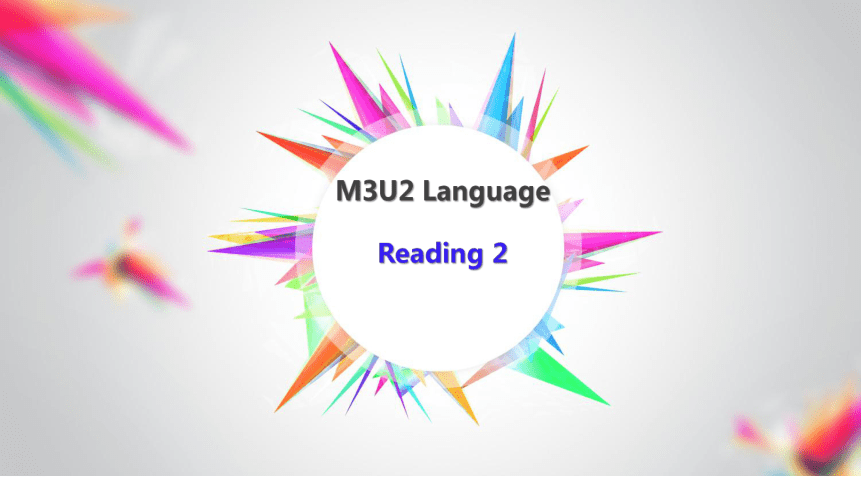
|
|
| 格式 | zip | ||
| 文件大小 | 862.0KB | ||
| 资源类型 | 教案 | ||
| 版本资源 | 牛津译林版 | ||
| 科目 | 英语 | ||
| 更新时间 | 2020-04-16 00:00:00 | ||
图片预览


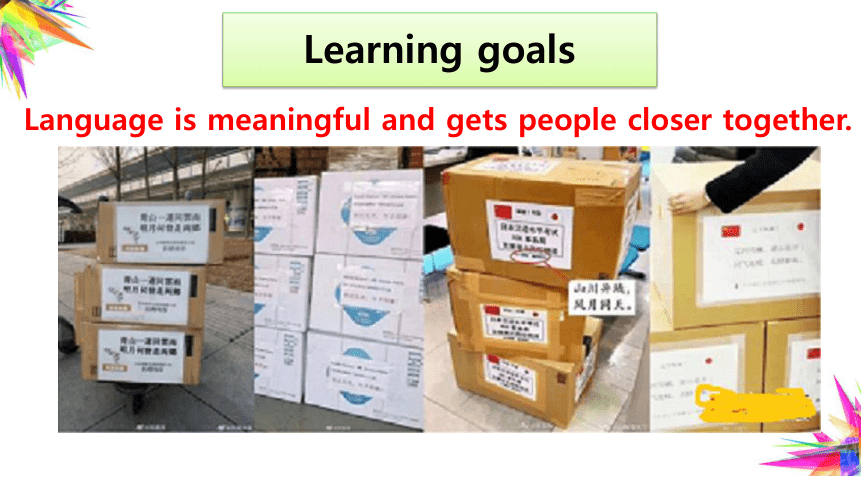
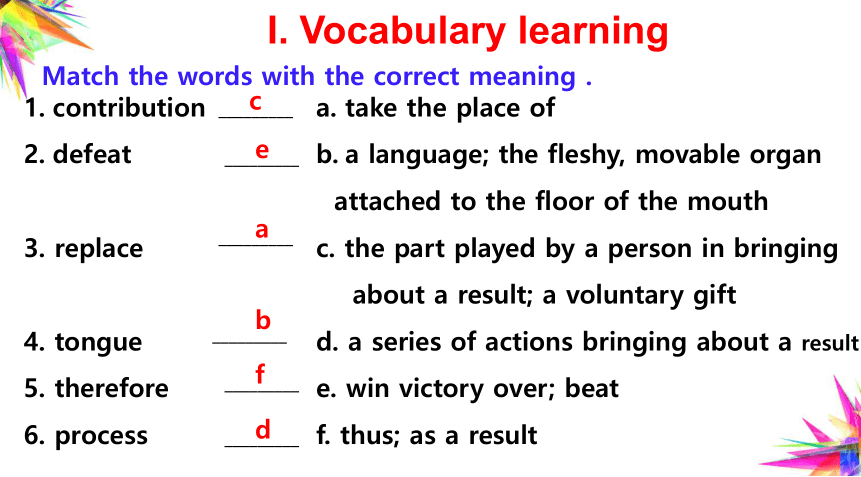
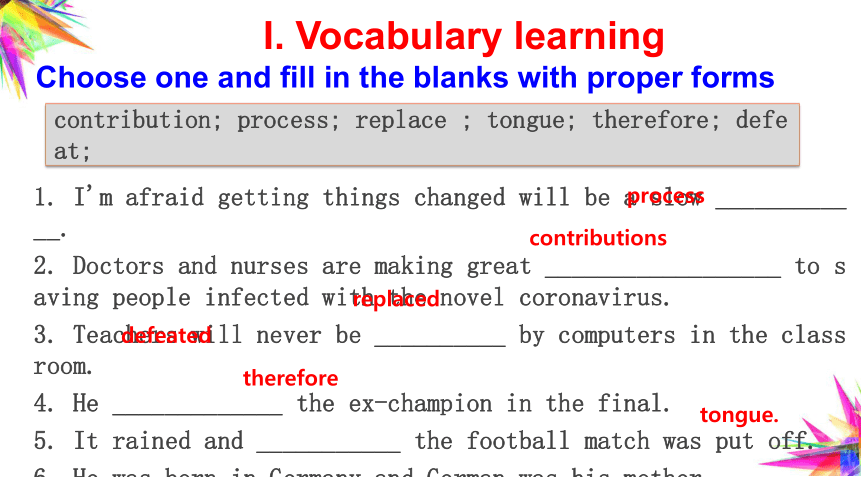
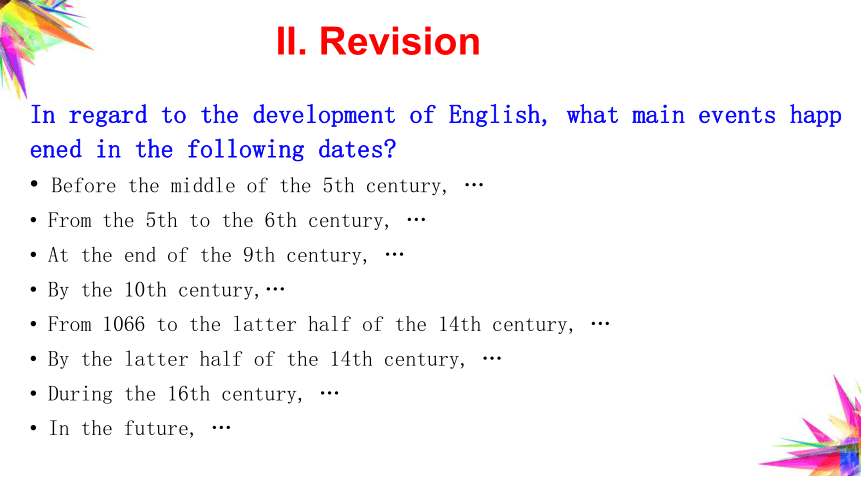
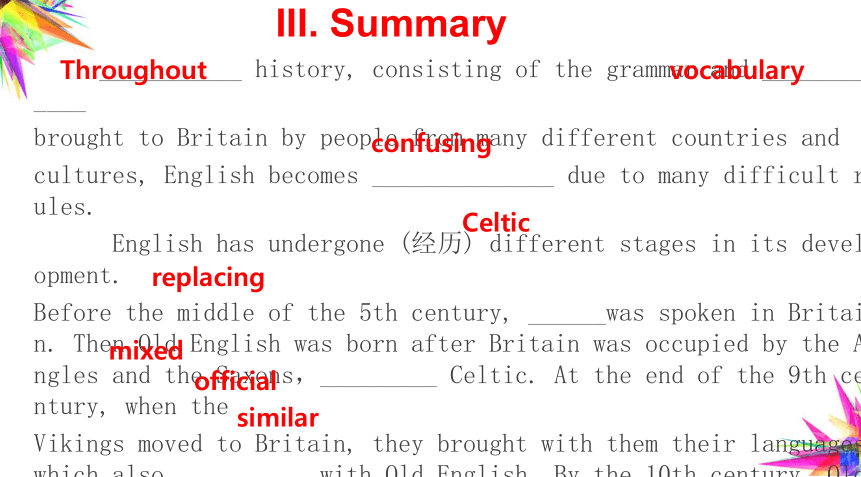
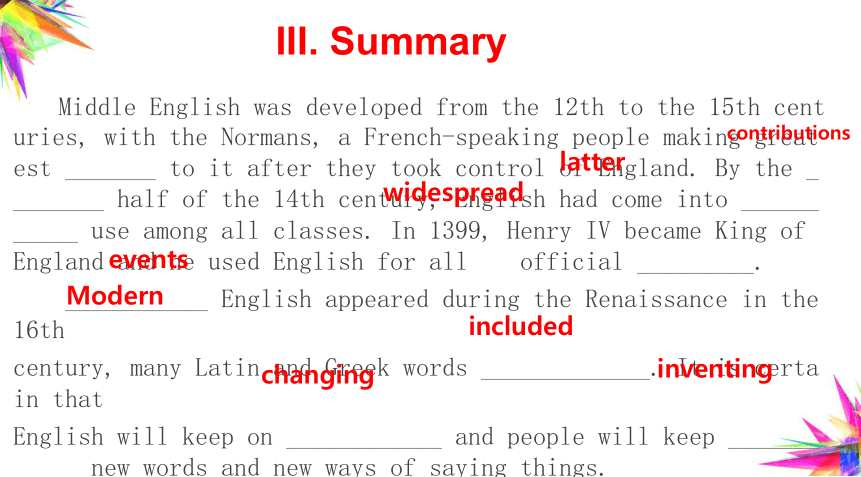

文档简介
(共23张PPT)
M3U2 Language
Reading 2
Learning goals
By the end of this lesson, you are supposed to
give a summary about the article “English and its history”;
know about the differences between British and American English;
learn some new words and expressions from the article;
have some basic language practice , using what we will learn today.
Language is meaningful and gets people closer together.
Learning goals
contribution
defeat
3. replace
4. tongue
5. therefore
6. process
take the place of
a language; the fleshy, movable organ
attached to the floor of the mouth
c. the part played by a person in bringing
about a result; a voluntary gift
d. a series of actions bringing about a result
e. win victory over; beat
f. thus; as a result
Match the words with the correct meaning .
_________
_________
_________
_________
I. Vocabulary learning
_________
_________
c
e
a
b
f
d
1. I'm afraid getting things changed will be a slow ____________.
2. Doctors and nurses are making great __________________ to saving people infected with the novel coronavirus.
3. Teachers will never be __________ by computers in the classroom.
4. He _____________ the ex-champion in the final.
5. It rained and ___________ the football match was put off.
6. He was born in Germany and German was his mother __________.
contribution; process; replace ; tongue; therefore; defeat;
process
contributions
replaced
defeated
therefore
tongue.
I. Vocabulary learning
Choose one and fill in the blanks with proper forms
In regard to the development of English, what main events happened in the following dates?
Before the middle of the 5th century, …
From the 5th to the 6th century, …
At the end of the 9th century, …
By the 10th century,…
From 1066 to the latter half of the 14th century, …
By the latter half of the 14th century, …
During the 16th century, …
In the future, …
II. Revision
___________ history, consisting of the grammar and ____________
brought to Britain by people from many different countries and
cultures, English becomes ______________ due to many difficult rules.
English has undergone (经历) different stages in its development.
Before the middle of the 5th century, ______was spoken in Britain. Then Old English was born after Britain was occupied by the Angles and the Saxons,_________ Celtic. At the end of the 9th century, when the
Vikings moved to Britain, they brought with them their languages, which also __________ with Old English. By the 10th century, Old English had become the __________ language of England, with different words and
phrases sharing ________ meanings.
Throughout
vocabulary
confusing
Celtic
replacing
mixed
official
similar
III. Summary
Middle English was developed from the 12th to the 15th centuries, with the Normans, a French-speaking people making greatest _______ to it after they took control of England. By the ________ half of the 14th century, English had come into ___________ use among all classes. In 1399, Henry IV became King of England and he used English for all official _________.
___________ English appeared during the Renaissance in the 16th
century, many Latin and Greek words _____________. It is certain that
English will keep on ____________ and people will keep _____________new words and new ways of saying things.
contributions
latter
widespread
events
Modern
included
changing
inventing
III. Summary
IV. Differences between British & American English
Complete an article about the differences /distinctions between
British English and American English. (Part E, P25)
Answers:
vocabulary
replaced
contributions
tongue
defeated
Therefore
process
IV. Differences between British & American English
Complete an article about the differences /distinctions between
British English and American English. (Part E, P25)
British English and American English differ from each other mainly
in three aspects:
Vocabulary
Spelling
Pronunciation
Aspect British English American English
Vocabulary
Spelling
Pronunciation
autumn
fall
colour
color
favour
favor
ask [ɑ?sk]
ask [?sk]
either [?a???(r)]
either [?i:??r]
/Accents
be made up of = consist of 由……组成/构成
make up 组成….; 化妆;编造;弥补;和好
make up for 为…弥补; 补偿
make up with sb. 与某人和好
The medical team sent to the disaster area was made up of/consisted of
five doctors and eight nurses.
Five doctors and eight nurses made up the team sent to the disaster area.
The couple made up in spite of the fierce quarrel the day before.
Her enthusiasm makes up for her lack of experience.
She spent too much time making herself up, which was why she was late.
V. Language focus
Pay attention to the following phrases
由…组成
组成
和好
弥补
打扮
occupy … vt. 占领,占有;占据;使从事,使忙于
occupy oneself in/with sth. 某人忙于某事
=sb. be occupied in/with sth. 某人忙于某事
occupy oneself in/with doing sth.某人忙于做某事
= sb. be occupied in /with doing…某人忙于做某事
Enemy troops occupied the country.
The research occupied much of his spare time.
He occupied himself in/with doing his research. 他忙着做他的研究。
He was occupied in /with his research. 他忙着做他的研究。
V. Language focus
Pay attention to the following phrases
占领
占据
忙于做某事
忙于某事
occupation n. 职业;占领;占用;消遣活动
I suppose I was looking for an occupation which was going
to be an adventure.
The occupation of a country happens when it is entered
and controlled by a foreign army.
Parachuting is a dangerous occupation.
V. Language focus
Pay attention to the following usage
消遣活动
占领
职业
name… after…/ be named after以……命名
name sb. as 提名某人为……; 任命某人为
The government decides to name the newly-built road after
the scientist in praise of his great contributions.
She was named after her grandmother.
The manager named her as the secretary.
V. Language focus
Pay attention to the following phrases
以……命名
以……命名
提名某人为
besides
except
except for
apart from= aside from
except that
except when
He also loves other ball games besides football.
He loves ball games except football.
His article is well written except for some grammar mistakes.
V. Language focus
Pay attention to the following phrases
besides 除此之外还有
except 除去此
except for 除了某一方面
apart/ aside from
Choose the proper words or phrases to fill in the blanks:
besides/except for/ except that/ except when/ apart from/aside from
____________________________________his wife, his daughter also
went to see him.
2. I know nothing about it ______________________ he told me.
Your essay is well written ______________________________________some spelling mistakes.
___________________________________English, he also has a good
knowledge of Russian and French.
5. I seldom go by bus _________________________ it is rainy.
Aside from/apart from/ Besides
except what
except for/apart from/ aside from
Besides/ Apart from/Aside from
except when
V. Language focus
contribute vt.&. 贡献; 捐赠; 投稿
contribute sth.to/ towards 捐赠, 捐献
contribute(sth.) to sth. 撰稿; 投稿
contribute to (doing) sth. 是…的原因之一; 有助于
contribution n. 贡献; 促成因素; 捐赠
make a contribution to/ towards sth. 对……作出贡献(捐赠)
We contributed $ 5,000 to the earthquake fund.
She contributed a number of articles to the magazine.
This book contributes little to our understanding of the subject.
All contributions, however small, will be greatly appreciated.
He has made an important contribution to the company s success.
V. Language focus
Pay attention to the following phrases
向…捐款
向…投稿
有助于
捐款
贡献
1. 占领;占用(时间、空间等)______________ vt. 职业, 占有;占用 _____________ n.
2. 使混合, 弄混; 参与, 交往 _____________ vt. 混合物, 糊涂, 混乱 ______________ n.
3. 有助于, 投稿, 捐助; 捐献 _____________ vt. / vi. ?捐助, 贡献, 捐助物 ____________ n.
4. 击败;使失败;战胜 _______________ vt. ?败北, 失败 ________________ n.
5. 放回; 代替; 取代; 归还 ________________ vt. 交换, 代替者, 更换 _______________ n.
6. 拼写 _____________________________vt. 拼写;________________________ n.
occupy
occupation
mix
mixture
contribute
contribution
defeat
defeat
replace
replacement
spell
spelling
Write down the correct words according to the meanings and
different parts of speech.
V. Language focus: Practice
7. 服务;服役;充当;供应 _______________vt. 佣人;仆人 ___________________ n.
8. 区别; 辨认出; 识别; 使.杰出 _____________ vt. ?区别; 特质;卓越______________ n.
独特的; 有特色的 _________________ adj.
9. 官方的;正式的; _________________ adj. 官方地;正式地 ______________ adv.
10. 官员 _________________n. 军官 _______________________ n.
11. 完全的;整个的 _________________ adj. 完全地; 彻底地 _______________ adv.
serve
servant
distinguish
distinction
distinctive
official
officially
official
officer
entire
entirely
Write down the correct words according to the meanings and
different parts of speech.
V. Language focus: Practice
Attention!
We will have more language practice in the next period. Remember to come back!
Have you been able to
give a summary about the article “English and its history”;
know about the differences between British and American English;
learn some new words and expressions from the article;
have some basic language practice , using what we will learn today
?
Homework
Have a revision of what we have learned today.
2. Finish today’s homework assigned on Suzhou Online
Education Center.
Thank you for your attention!
See you next time!
M3U2 Language
Reading 2
Learning goals
By the end of this lesson, you are supposed to
give a summary about the article “English and its history”;
know about the differences between British and American English;
learn some new words and expressions from the article;
have some basic language practice , using what we will learn today.
Language is meaningful and gets people closer together.
Learning goals
contribution
defeat
3. replace
4. tongue
5. therefore
6. process
take the place of
a language; the fleshy, movable organ
attached to the floor of the mouth
c. the part played by a person in bringing
about a result; a voluntary gift
d. a series of actions bringing about a result
e. win victory over; beat
f. thus; as a result
Match the words with the correct meaning .
_________
_________
_________
_________
I. Vocabulary learning
_________
_________
c
e
a
b
f
d
1. I'm afraid getting things changed will be a slow ____________.
2. Doctors and nurses are making great __________________ to saving people infected with the novel coronavirus.
3. Teachers will never be __________ by computers in the classroom.
4. He _____________ the ex-champion in the final.
5. It rained and ___________ the football match was put off.
6. He was born in Germany and German was his mother __________.
contribution; process; replace ; tongue; therefore; defeat;
process
contributions
replaced
defeated
therefore
tongue.
I. Vocabulary learning
Choose one and fill in the blanks with proper forms
In regard to the development of English, what main events happened in the following dates?
Before the middle of the 5th century, …
From the 5th to the 6th century, …
At the end of the 9th century, …
By the 10th century,…
From 1066 to the latter half of the 14th century, …
By the latter half of the 14th century, …
During the 16th century, …
In the future, …
II. Revision
___________ history, consisting of the grammar and ____________
brought to Britain by people from many different countries and
cultures, English becomes ______________ due to many difficult rules.
English has undergone (经历) different stages in its development.
Before the middle of the 5th century, ______was spoken in Britain. Then Old English was born after Britain was occupied by the Angles and the Saxons,_________ Celtic. At the end of the 9th century, when the
Vikings moved to Britain, they brought with them their languages, which also __________ with Old English. By the 10th century, Old English had become the __________ language of England, with different words and
phrases sharing ________ meanings.
Throughout
vocabulary
confusing
Celtic
replacing
mixed
official
similar
III. Summary
Middle English was developed from the 12th to the 15th centuries, with the Normans, a French-speaking people making greatest _______ to it after they took control of England. By the ________ half of the 14th century, English had come into ___________ use among all classes. In 1399, Henry IV became King of England and he used English for all official _________.
___________ English appeared during the Renaissance in the 16th
century, many Latin and Greek words _____________. It is certain that
English will keep on ____________ and people will keep _____________new words and new ways of saying things.
contributions
latter
widespread
events
Modern
included
changing
inventing
III. Summary
IV. Differences between British & American English
Complete an article about the differences /distinctions between
British English and American English. (Part E, P25)
Answers:
vocabulary
replaced
contributions
tongue
defeated
Therefore
process
IV. Differences between British & American English
Complete an article about the differences /distinctions between
British English and American English. (Part E, P25)
British English and American English differ from each other mainly
in three aspects:
Vocabulary
Spelling
Pronunciation
Aspect British English American English
Vocabulary
Spelling
Pronunciation
autumn
fall
colour
color
favour
favor
ask [ɑ?sk]
ask [?sk]
either [?a???(r)]
either [?i:??r]
/Accents
be made up of = consist of 由……组成/构成
make up 组成….; 化妆;编造;弥补;和好
make up for 为…弥补; 补偿
make up with sb. 与某人和好
The medical team sent to the disaster area was made up of/consisted of
five doctors and eight nurses.
Five doctors and eight nurses made up the team sent to the disaster area.
The couple made up in spite of the fierce quarrel the day before.
Her enthusiasm makes up for her lack of experience.
She spent too much time making herself up, which was why she was late.
V. Language focus
Pay attention to the following phrases
由…组成
组成
和好
弥补
打扮
occupy … vt. 占领,占有;占据;使从事,使忙于
occupy oneself in/with sth. 某人忙于某事
=sb. be occupied in/with sth. 某人忙于某事
occupy oneself in/with doing sth.某人忙于做某事
= sb. be occupied in /with doing…某人忙于做某事
Enemy troops occupied the country.
The research occupied much of his spare time.
He occupied himself in/with doing his research. 他忙着做他的研究。
He was occupied in /with his research. 他忙着做他的研究。
V. Language focus
Pay attention to the following phrases
占领
占据
忙于做某事
忙于某事
occupation n. 职业;占领;占用;消遣活动
I suppose I was looking for an occupation which was going
to be an adventure.
The occupation of a country happens when it is entered
and controlled by a foreign army.
Parachuting is a dangerous occupation.
V. Language focus
Pay attention to the following usage
消遣活动
占领
职业
name… after…/ be named after以……命名
name sb. as 提名某人为……; 任命某人为
The government decides to name the newly-built road after
the scientist in praise of his great contributions.
She was named after her grandmother.
The manager named her as the secretary.
V. Language focus
Pay attention to the following phrases
以……命名
以……命名
提名某人为
besides
except
except for
apart from= aside from
except that
except when
He also loves other ball games besides football.
He loves ball games except football.
His article is well written except for some grammar mistakes.
V. Language focus
Pay attention to the following phrases
besides 除此之外还有
except 除去此
except for 除了某一方面
apart/ aside from
Choose the proper words or phrases to fill in the blanks:
besides/except for/ except that/ except when/ apart from/aside from
____________________________________his wife, his daughter also
went to see him.
2. I know nothing about it ______________________ he told me.
Your essay is well written ______________________________________some spelling mistakes.
___________________________________English, he also has a good
knowledge of Russian and French.
5. I seldom go by bus _________________________ it is rainy.
Aside from/apart from/ Besides
except what
except for/apart from/ aside from
Besides/ Apart from/Aside from
except when
V. Language focus
contribute vt.&. 贡献; 捐赠; 投稿
contribute sth.to/ towards 捐赠, 捐献
contribute(sth.) to sth. 撰稿; 投稿
contribute to (doing) sth. 是…的原因之一; 有助于
contribution n. 贡献; 促成因素; 捐赠
make a contribution to/ towards sth. 对……作出贡献(捐赠)
We contributed $ 5,000 to the earthquake fund.
She contributed a number of articles to the magazine.
This book contributes little to our understanding of the subject.
All contributions, however small, will be greatly appreciated.
He has made an important contribution to the company s success.
V. Language focus
Pay attention to the following phrases
向…捐款
向…投稿
有助于
捐款
贡献
1. 占领;占用(时间、空间等)______________ vt. 职业, 占有;占用 _____________ n.
2. 使混合, 弄混; 参与, 交往 _____________ vt. 混合物, 糊涂, 混乱 ______________ n.
3. 有助于, 投稿, 捐助; 捐献 _____________ vt. / vi. ?捐助, 贡献, 捐助物 ____________ n.
4. 击败;使失败;战胜 _______________ vt. ?败北, 失败 ________________ n.
5. 放回; 代替; 取代; 归还 ________________ vt. 交换, 代替者, 更换 _______________ n.
6. 拼写 _____________________________vt. 拼写;________________________ n.
occupy
occupation
mix
mixture
contribute
contribution
defeat
defeat
replace
replacement
spell
spelling
Write down the correct words according to the meanings and
different parts of speech.
V. Language focus: Practice
7. 服务;服役;充当;供应 _______________vt. 佣人;仆人 ___________________ n.
8. 区别; 辨认出; 识别; 使.杰出 _____________ vt. ?区别; 特质;卓越______________ n.
独特的; 有特色的 _________________ adj.
9. 官方的;正式的; _________________ adj. 官方地;正式地 ______________ adv.
10. 官员 _________________n. 军官 _______________________ n.
11. 完全的;整个的 _________________ adj. 完全地; 彻底地 _______________ adv.
serve
servant
distinguish
distinction
distinctive
official
officially
official
officer
entire
entirely
Write down the correct words according to the meanings and
different parts of speech.
V. Language focus: Practice
Attention!
We will have more language practice in the next period. Remember to come back!
Have you been able to
give a summary about the article “English and its history”;
know about the differences between British and American English;
learn some new words and expressions from the article;
have some basic language practice , using what we will learn today
?
Homework
Have a revision of what we have learned today.
2. Finish today’s homework assigned on Suzhou Online
Education Center.
Thank you for your attention!
See you next time!
